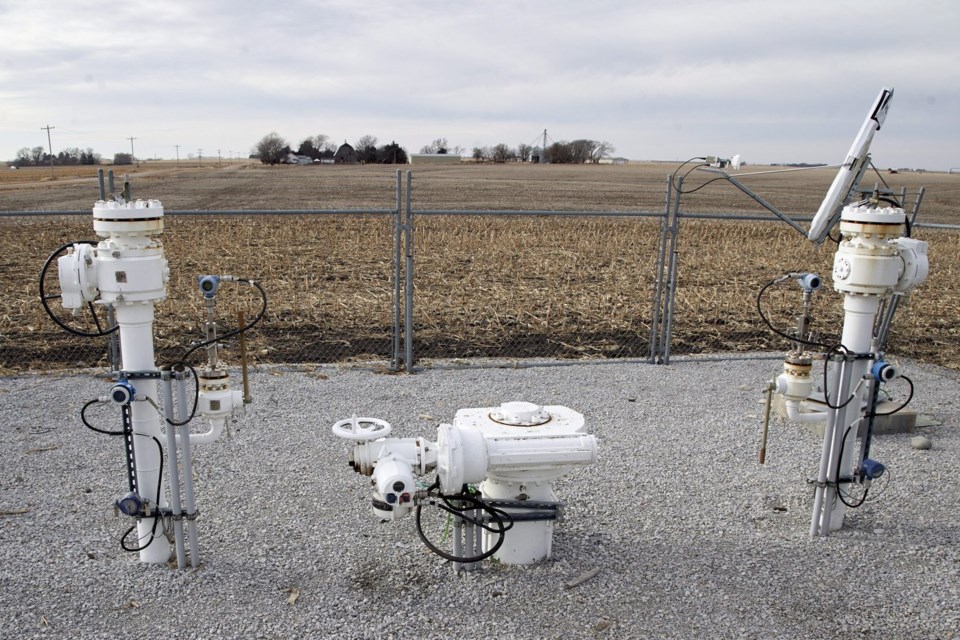CALGARY — U.S. President Donald Trump says he'd like to see the Keystone XL pipeline brought back from the dead, garnering an enthusiastic reception from Alberta and Saskatchewan's premiers but a tepid one from the company spun off from its erstwhile proponent.
Trump posted on his Truth Social platform Monday that the Biden administration had "viciously jettisoned" the pipeline expansion that would have allowed more oilsands crude to flow to the U.S. Gulf Coast, cutting diagonally through Montana, South Dakota and Nebraska before heading south.
"The Trump administration is very different — easy approvals, almost immediate start! If not them, perhaps another pipeline company," he wrote.
"We want the Keystone XL Pipeline built!"
Alberta Premier Danielle Smith said Tuesday in an X post that she agreed with Trump.
"That project should have never been cancelled. Lower fuel costs for American families is a big win," she said.
"Let’s also scrap these inflationary tariff ideas and focus on getting shovels in the ground right away!"
Saskatchewan Premier Scott Moe also voiced his support for the idea on X.
"The path to continental energy dominance is to increase non-tariff North American trade," Moe wrote.
"This includes the construction of new pipelines like Keystone XL."
A spokeswoman for South Bow Corp., the oil pipeline operator spun off from TC Energy Corp. last fall and now the owner of the existing Keystone system, said the company has "moved on" from the XL expansion project.
"We continue to engage with customers to develop options to increase Canadian oil supplies to meet growing demand," Katie Stavinoha said in an email Tuesday.
The Keystone XL project — a 1,900-kilometre pipeline that would have run from Hardisty, Alta., to the major U.S. crude storage hub at Cushing, Okla., and then on to Gulf Coast refineries — was first proposed during the Obama administration, which rejected it on environmental grounds.
It was then revived under the first Trump administration, before former president Joe Biden killed it again by revoking the pipeline’s permit on his first day in the White House in 2021.
Meanwhile, Trump told a press conference Monday that tariffs on Canadian and Mexican products are coming next week.
Trump's executive order to hit all Canadian imports with 25 per cent tariffs, except a 10 per cent levy on energy, was delayed until March 4 after Canada agreed to introduce new security measures at the border.
Richard Masson, executive fellow with the University of Calgary's School of Public Policy, said the interest in resuscitating Keystone XL doesn't jibe with Trump's plans to ramp up domestic oil production while slapping U.S. neighbours with tariffs.
"It seems inconsistent to say we're going to tariff the existing oil that's coming in and still try and get somebody to build a pipeline," he said.
"It just doesn't make a lot of sense."
Masson said he suspects Trump is "just really playing to his base," which is keen on developing oil projects in general.
The Canadian government is "open to having a productive conversation" about advancing Keystone XL, the communications director for Natural Resources Minister Jonathan Wilkinson said in an email.
"Canadians have always been a reliable energy supplier to our American friends — but unjustified tariffs and threats against our sovereignty hurt our ability and desire to be an energy partner to our southern neighbour," said Joanna Sivasankaran.
The Keystone XL project in its current form has all the Canadian permits it needs and the pieces north of the border remain in the ground, Sivasankaran added.
"A private sector proponent would need to step forward to advance the project, and there is not currently one expressing they would do so," she said.
"Canada wants to see our continent become an energy-secure superpower, and the government is supportive of steps that secure positive outcomes for Canadians."
Masson said he can't see any company jumping at the chance to propose a pipeline that two U.S. presidents have cancelled.
“It's been a really bitter pill for most people in the industry to swallow and why would anybody want to take that on, unless maybe you had an explicit guarantee from the U.S. that was ironclad that said if things go south, they'll pay for it."
Several oil producers would also have to sign up to ship significant volumes on the line for decades, "and there just isn't that much oil planned to be produced in Canada these days."
Producers could justify oilsands expansions, which require years of lead time and billions in investment, if market access were guaranteed, Masson added.
"That's not an issue," he said.
"But you've got to get the timing of those things right. And right now the level of uncertainty is so high that it seems really difficult to see how that could happen.”
This report by The Canadian Press was first published Feb. 25, 2025.
Companies in this story: (TSX: SOBO, TSX: TRP)
Lauren Krugel, The Canadian Press



